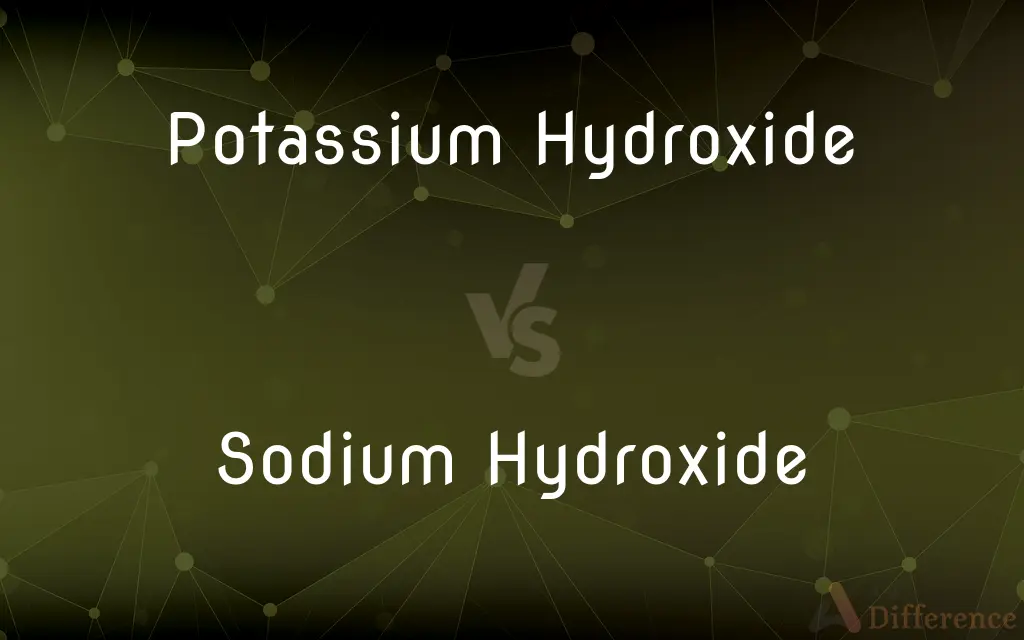Potassium Hydroxide vs. Sodium Hydroxide — What's the Difference?
By Tayyaba Rehman — Published on November 5, 2023
Potassium Hydroxide (KOH) and Sodium Hydroxide (NaOH) are strong alkalis used in chemical processes, differing mainly in their atomic composition and some properties.

Difference Between Potassium Hydroxide and Sodium Hydroxide
Table of Contents
ADVERTISEMENT
Key Differences
Potassium Hydroxide and Sodium Hydroxide are both highly caustic substances and are widely used in various industrial and chemical processes. Potassium Hydroxide (KOH) has potassium ions and hydroxide ions in its composition, while Sodium Hydroxide (NaOH) contains sodium ions and hydroxide ions. Both are soluble in water and release hydroxide ions, which make them strong bases.
While both Potassium Hydroxide and Sodium Hydroxide are employed in the manufacturing of soap, they yield different types of soap due to their distinct metallic cations. When used in saponification, Potassium Hydroxide tends to produce a softer or liquid soap, while Sodium Hydroxide creates a hard bar soap. The kind of soap produced is often contingent on the specific hydroxide used.
In the realm of chemical properties, both Potassium Hydroxide and Sodium Hydroxide exhibit strong basic characteristics and are corrosive in nature. However, Potassium Hydroxide has a slightly higher solubility in water and can absorb moisture from the air more readily compared to Sodium Hydroxide, meaning KOH can be more hazardous in certain applications.
In terms of availability and cost, Sodium Hydroxide is generally more accessible and less expensive than Potassium Hydroxide. Both substances can be found in various forms, such as pellets, flakes, or solutions, but Sodium Hydroxide tends to be more commonly utilized in both industrial and laboratory settings due to its cost-effectiveness.
Comparison Chart
Formula
KOH
NaOH
ADVERTISEMENT
Molar Mass
56.11 g/mol
39.997 g/mol
Solubility in Water
Highly soluble (1120 g/L at 20 °C)
Highly soluble (1110 g/L at 20 °C)
Physical Form in Soap Making
Produces softer or liquid soap
Produces hard soap
Cost and Availability
Generally more expensive and less available
More affordable and widely available
Compare with Definitions
Potassium Hydroxide
A strong inorganic base.
Potassium Hydroxide is used in the production of biodiesel.
Sodium Hydroxide
A solid white, deliquescent compound.
Sodium Hydroxide can be dangerous when in contact with skin.
Potassium Hydroxide
A caustic compound used in manufacturing.
Potassium Hydroxide is crucial for making liquid soaps.
Sodium Hydroxide
An essential in various chemical reactions.
Sodium Hydroxide plays a pivotal role in synthesizing many chemicals.
Potassium Hydroxide
A hydroxide where potassium replaces sodium.
High concentrations of Potassium Hydroxide are found in drain cleaners.
Sodium Hydroxide
A strong, caustic metal base.
Sodium Hydroxide is widely used in the paper industry.
Potassium Hydroxide
A chemical base used in industrial applications.
Potassium Hydroxide is often used in alkaline batteries.
Sodium Hydroxide
A common ingredient in soap making.
The lye used in soap making is often composed of Sodium Hydroxide.
Potassium Hydroxide
A substance used to control pH levels.
Be cautious when using Potassium Hydroxide due to its corrosive nature.
Sodium Hydroxide
A pH regulator in various applications.
Sodium Hydroxide neutralizes acids in a chemical process.
Common Curiosities
What are Potassium Hydroxide and Sodium Hydroxide?
Both are strong alkalis and are used in various chemical processes.
What is Sodium Hydroxide's role in soap-making?
Sodium Hydroxide reacts with fats/oils to produce soap.
Can Sodium Hydroxide be used in food preparation?
Yes, but only in specific, regulated uses (like curing olives).
Is Sodium Hydroxide present in cleaning solutions?
Yes, it's often in detergents and cleaners due to its caustic nature.
Which hydroxide is more commonly used in industry?
Sodium Hydroxide, due to its accessibility and cost-effectiveness.
How should Sodium Hydroxide be stored?
In a cool, dry place, away from moisture and incompatible substances.
Is Potassium Hydroxide used in cosmetics?
Yes, often in regulated amounts to maintain pH levels.
Can Potassium Hydroxide be found in household products?
Yes, in items like drain cleaners and oven degreasers.
Is Potassium Hydroxide safe to touch?
No, Potassium Hydroxide is caustic and can cause burns.
Is Sodium Hydroxide harmful to the environment?
In high concentrations, it can be harmful to aquatic life.
Can both alkalis be used interchangeably?
Not always, due to differences in properties and results.
How are Potassium Hydroxide and Sodium Hydroxide produced?
Typically, through the electrolysis of their respective chlorides.
Can you neutralize Potassium Hydroxide with acid?
Yes, it can be neutralized using an acid, forming water and a salt.
What happens when Potassium Hydroxide is dissolved in water?
It dissociates into potassium and hydroxide ions, releasing heat.
Is there a risk when mixing Potassium Hydroxide with other chemicals?
Yes, care must be taken as it can react violently with certain chemicals.
Share Your Discovery

Previous Comparison
Sahara Deserts vs. Ladakh Deserts
Next Comparison
Indian Ocean vs. Arabian SeaAuthor Spotlight
Written by
Tayyaba RehmanTayyaba Rehman is a distinguished writer, currently serving as a primary contributor to askdifference.com. As a researcher in semantics and etymology, Tayyaba's passion for the complexity of languages and their distinctions has found a perfect home on the platform. Tayyaba delves into the intricacies of language, distinguishing between commonly confused words and phrases, thereby providing clarity for readers worldwide.













































